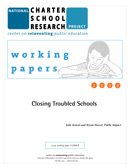Performance accountability is meaningless unless real sanctions exist for schools that fail to meet basic academic standards. And yet, as fifteen years of charter school development have shown, closing schools is one of the thorniest problems authorizers face. It brings legal, political, emotional and logistical costs, as even school with lackluster performance may have teachers, students, parents and community members who advocate for their survival.
This paper draws upon interviews with six high-quality charter school authorizers and two traditional school districts that have successfully closed schools. It finds that schools are most likely to be closed for chronic student failure, organizational dysfunction, and financial distress, and identifies several strategies to minimize challenges. These include involving key stakeholders early and often; developing clear and objective review criteria and enlisting external evaluators to make tough calls; and creating support structures to help displaced students secure quality alternatives.
While school closure will never be easy, the authors note it can provide an opportunity. Instead of viewing closures as a dreaded and rare occurrence in public education, districts can use them as part of an overall improvement strategy that aligns with and reinforces core values.




